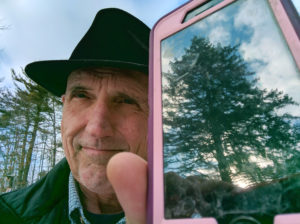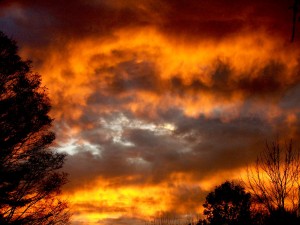iFone New Years Story
The iPhone had been buried in a huge pile of snow plowed to clear Main Street after the storm a few days before Christmas. On December 26, under a bright sun and a thaw, the snow pile began to shift and sink, and by Wednesday morning, like a receding glacier giving up its dead, it gave up the phone. I found it lying face up, balanced on a small column of ice, a pedestal protected from the sun by the phone’s own shadow.
Its face was smeared with mud and grit. No cracks, no apparent damage. I carried it into the coffee shop and laid it on the table. It seemed so vulnerable, so bereft of connection and purpose. Bought myself a coffee and took a closer look. The outer case was purple rubber, wrapped around an inner protective layer of hard pink plastic. An expensive case on a new $800 phone. From the look of the case I guessed that the owner was a woman, probably in her 30s. Perhaps the phone was a pre-Christmas gift, and because it had been a week since she lost it, she was probably about to give up on ever seeing it again.
It lay on the table in a tiny puddle of snowmelt. I pushed the buttons that should have brought it to life, but it was unresponsive. At the very least this was a phone with a dead battery. At most it was a waterlogged chunk of delicate electronics that had given up the ghost. A digital ghost, though, which if the owner had made the proper prior arrangements, would have departed no further than some server farm run by Apple in Boise or Fresno or, I dunno, Kansas City. This phone would not have shuffled off its mortal coil.
So, look, how smart really is a phone like this? Smart enough to have feelings? Smart enough to know the choking panic of being buried alive in an avalanche? Certainly smart enough to know where it is, and whether it’s right side up or upside down. Could a device like this love its owner as much as its owner loves it? Is there a bond, a relationship? If your face were touched a hundred times a day by the same finger, the print of which could also serve to unlock you, would you not feel some type of affection, some longing, some need for that attention? But no, it’s silly to call it love, because love is more, is it not, than the negotiation, the bid we make for attention?
As its battery drained, electric juice siphoned off by monitoring the signals from cell towers and GPS satellites, by incoming messages and notifications and calls no doubt from its owner who probably walked this street in the day after she lost it, using somebody else’s phone to call her own, listening with a sinking heart for that ring tone…as the phone sank into coma, isn’t it possible that it may, in some rudimentary way, have felt its loss, perhaps even that terror that all living creatures feel, the terror of being alone?
It is, after all, why we love these devices so completely, is it not? They have become our talismans, our protection against that original fear. If we need them so desperately, doesn’t it seem possible that they may need us in the same way? Isn’t that the way human beings domesticated dogs? Or the way mitochondria, which were originally free-swimming microbes, set up housekeeping inside our cells? But, honestly, aren’t we just about there? Love aside, the phones can’t exist without us, and how long will it be before we can’t exist without them?
I plugged this lost phone into a charger when I got home, and watched it blink to life under the mud on its face. Five minutes later, with a series of bleats, message notifications began to pour in. A dozen, two dozen and more. So now I knew her first name, M., and I knew that her phone was alive, and I knew that a lot of people had been trying to reach her.
I let the phone charge for another 15 minutes, found that it was not locked or passworded, and, with some reluctance, because I have a strong taboo against poking around in other peoples’ private spaces, I swiped into her phone. I checked Maps first, and found she had set up a Home route. So her phone could actually lead me to her house in a nearby town if I had no other way of finding her.
I looked at a couple of her photos to see if I recognized anybody, but went no further when all I saw were strangers. The next, least invasive, place for me to go was Contacts. Her list was short, and one of them was Heather, a friend and neighbor of mine. I called Heather, but her message box was full. Next in Contacts I found Laura, no last name. Obviously a close friend.
So yes, Laura answered my call and gave me M.’s land line. Laura told me that her good friend M. would be one very, very happy woman. Half an hour later I put M.’s phone in her hand. She seemed close to tears. She hugged me. It had been a rough week for her in several ways she said, but against all her expectations, her phone had come home. We hugged again…for some reason I can’t really explain, I felt deeply grateful to her.
It has been a long time since I’ve enjoyed the gift of being a partner to some stranger’s good fortune. I liked the feeling. I want more of it. Perhaps I should spend this next year looking for more lost phones. Or perhaps I should find a more direct way of putting good fortune out into the world. It will be a happy new year.
Category Archives: Living on Earth
A Thousand Shades of Green: Spring in NH
Those of us who have been living under winter’s cold, white thumb for the past month sometimes lose all sense of perspective. Harsh winters somehow manage to lock down our feeling for the passage time. We feel trapped in the timeless Now, a place of never-ending ice and snow and cold. Gee, sounds a bit like the plot for a fairy tale, no? But faith in the flow of the seasons evaporates like the sublimation of ice at 20 below. O my god, we will be here forever. But no, friends in cold lands, do not lose faith. Spring will come, as it always has. And lest you’ve forgotten what it looks like, I offer you this memory. A little movie made from the footage I shot at D Acres, a small farm in northern NH.
Drink in the green.
The Wandering Sun: The solstice has always been our biggest party

Read the full essay
Waterloo Road runs east and west in front of my house, along the Warner River through a narrow valley on the shadows’ side of the Mink Hills. Before the sun rises on December mornings into the pale blue gap between a bank of clouds and the horizon, its orange light lies first on the crown and shoulder of a little mountain called Chandler just a mile south of our house. During the summer the sun rises too far north on the horizon to light the mountain like this and so, after a week of overcast mornings at the end of November and another week of mornings when I left the house before the sun had risen, this first light on the mountain takes me by surprise.
For weeks, of course, I have been dimly aware each day that the daylight has been weaker, the darkness gathering more quickly on the drive home. Vague feelings of discomfort and anxiety trouble me as this darkness closes in at both ends of the day.
I like the darkness of a summer night, when the dew releases the smells of the earth and grasses, but these long December nights with their crystalline starlight give me the willies.
Each morning for the past two weeks I’ve been sitting by the wood stove to drink a cup of coffee and watch the sun rise, though more often than not all I’ve seen for my trouble is the progressive lightening of a heavy grey sky.
On those days when the sun itself has appeared, its rays stream in the window on the southeast side of the house and daily reach deeper and deeper into the back of the house. I’ve watched the sun rise first over the edge of a pine grove, then, several days later over the roof of a neighboring house, and now over a low hill south of the river. Its path seems to be dropping away from the earth like the spiral of an orange’s skin as the knife peels it away from the fruit.
If this were my first experience with the phenomenon, I might have great cause for alarm. There is nothing in the observation of the sun’s daily slippage south to suggest that the process will be halted or reversed. At this rate, if nothing changes, I estimate that by February the sun will be rising over the eastern shoulder of Chandler Mountain and setting on the western. By spring it will flicker briefly like an airport beacon on the mountain top and then disappear forever. It is a particularly, perhaps exclusively, human fear, this annual concern with old Sol’s faithfulness to his duties on the planet.
On December 21, if the sun’s rising is not obscured by clouds, and if my good intentions prove sufficient to wake me in time, I plan to trace on the back wall of the sitting room the outline of whatever shadow the sun’s light casts.
That tracing will remain like a low-water mark as a record of this shortest day of the year, next to the door-jamb where we’ve been marking our kids’ heights as they grow.
Brief as my recognition of the solstice will be, it is nevertheless in keeping with what all ancient astronomical observations and celebrations everywhere and in every era have meant to do—remind ourselves of our place in the universe, swinging around the sun through space on this little ball of living dirt and water, utterly dependent on that fat hot star, our gravitational minder, for the light and heat that give us life.
